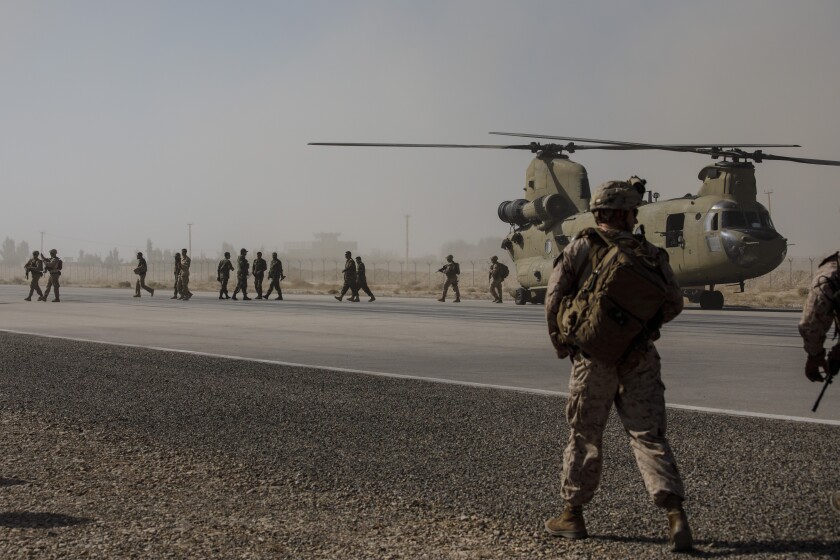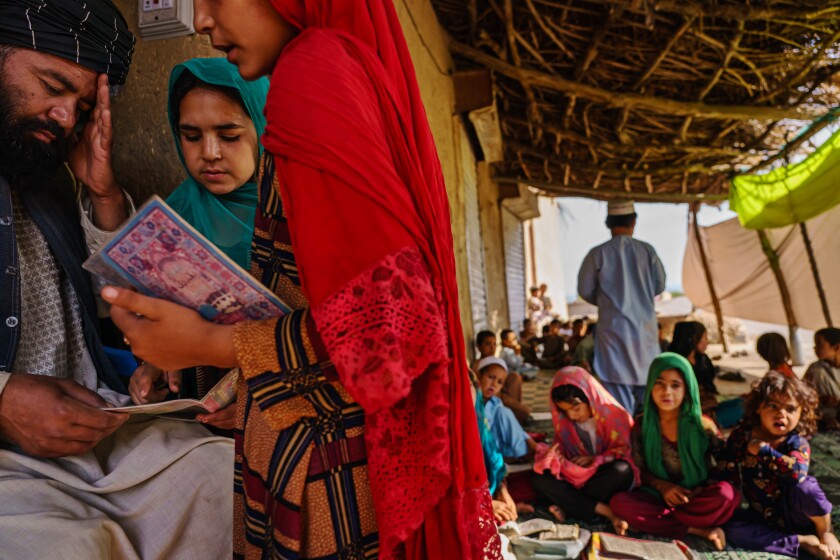Stunning speed of Taliban victories ramps up the pressure on Kabul and Washington
With a sixth provincial capital in its hands Monday and attacks pounding a seventh, the Taliban has stunned observers with its lightning takeover of large swaths of Afghanistan in recent days â€" raising uncomfortable questions for Washington as the Biden administration forges ahead with its rapid withdrawal of troops from the war-torn country.
Monday saw the Taliban advance on Gardez, the capital of Paktia province in Afghanistan’s east. Officials also confirmed to local media outlets that the radical Islamic group had taken Aybak, the capital of northern Samangan province, as fighters pressed ahead with a countrywide offensive that has seen a crushing rout of Afghan government forces in many places.
As part of the 2020 peace deal between the Taliban and the Trump administration, the insurgents, who control much of the Afghan countryside, had pledged to avoid attacking the country’s 34 provincial capitals, which have remained â€" with U.S. and NATO assistance â€" bastions of government control.
But the last week has seen no fewer than five provincial centers fall to the Taliban, some without a fight. On Friday, the group seized the southwestern city of Zaranj, the capital of Nimroz province, forcing Afghan government fighters to flee across the border to Iran. The following day, the Taliban captured Sheberghan, the capital of Jowzjan province and home to Abdul Rashid Dostum, an Afghan warlord whose fighters proved no match for the attackers.
By Sunday, the insurgents had blitzed through wide swaths of the country’s north â€" which in the 1990s mounted the strongest resistance to the Taliban â€" and taken three more provincial capitals: Sar-e-Pul, Taloqan and Kunduz, a long-sought-after prize that the group had briefly seized in 2015 and 2016.
Its stunning string of battlefield successes has given the Taliban control of the north, the southwest and parts of the east, setting up the group to make an eventual bid for the biggest prize of all: the national capital, Kabul. It also marks a “new, deadlier and more destructive phase†of the Afghan war, Deborah Lyons, the United Nations’ special representative for Afghanistan, told the United Nations Security Council in a briefing Friday.

World & Nation
‘I definitely want to stay’: Afghan women grapple with prospect of life under the Taliban again
As the U.S. hastens to exit Afghanistan by Aug. 31, women fear a potential return to power by the Taliban and its harsh view of their role in society.
“This is a clear attempt by the Taliban to seize urban centers with the force of arms. The human toll of this strategy is extremely distressing â€" and the political message is even more deeply disturbing,†she said.
The swift advance has escalated pressure on the Biden administration, which has pledged to maintain its support of the Afghan government even as U.S. troops prepare to quit the country completely by Aug. 31, ending 20 years of direct combat. Afghan President Ashraf Ghani has blamed the pullout for the worsening violence, and some observers warn that the country could become a terrorist haven once again.
But Washington appears determined not to change the withdrawal timetable.
“President Biden has made that clear. We’re going out and … are staying out,†Ryan Crocker, who served briefly as U.S. ambassador to Afghanistan under President Obama, said in an interview Sunday with ABC’s “This Week.â€

Politics
Do Biden administration assurances on Afghanistan reflect the reality on the ground?
U.S. defense of its Afghanistan pullout is based on a conviction that education and development gains are irreversible. But reality is very different.
“We knew from the beginning â€" and the president would be the first to say this â€" that there are difficult choices a commander in chief needs to make on behalf of the American people,†White House Press Secretary Jen Psaki said Friday, adding: “The Afghan government and the Afghan National Defense Forces have the training, equipment, and numbers to prevail, and now is the moment for the leadership and the will in the face of the Taliban’s aggression and violence.â€
The Taliban’s advance has also underscored the vulnerability of the Afghan security forces, who have faced a grueling trial by fire since insurgents stepped up their offensive in May as American troops began their withdrawal.
Afghan troops have long relied on airpower for a crucial advantage over their Taliban adversaries and to resupply far-flung outposts across the country. With American support dwindling, and the Afghan air force unable to maintain the operational tempo, Afghan soldiers have been forced to retrench their defense posture, ceding territory with little or no fighting while they focus on strategic areas such as Herat in the west and Lashkar Gah and Kandahar in the south.
Yet that retrenchment may not be enough, said one high-ranking Afghan defense official who spoke on condition of anonymity in order to comment freely. He predicted that the wave of provincial capitals falling to the Taliban would continue until mid-September.
“I don’t think we can hold Kandahar,†he said, adding that Kabul, the seat of the government’s power and the city with the best defenses, was likely to come under attack by the Taliban sometime next month.

World & Nation
‘The Taliban will come ... 100%.’ As U.S. withdraws, Kandahar faces a takeover
As U.S. forces pull out from Afghanistan, the Taliban is in the ascendant â€" and threatening to retake the city that was its former spiritual capital.
Although the government insists the Taliban’s victories are more on social media than on the battlefield, the group now holds more than a third â€" some estimates say more than half â€" of Afghanistan’s districts. It also controls most of the land-locked nation’s border crossings, and has solidified its grip over much of the country’s highways, leaving the islands of government-held territory all but besieged.
That sense of government isolation has only increased in recent days in some of Afghanistan’s largest cities, including Kandahar and Herat, where Taliban fighters briefly disrupted air travel at those cities’ airports.
Taliban spokesman Zabihullah Mujahid said in a tweet Monday that the group was now attacking Mazar-e-Sharif and had taken the main defensive base in Gardez.
“Fighting is currently raging on the city’s outskirts,†he tweeted.
NewsletterBreaking News
Get breaking news, investigations, analysis and more signature journalism from the Los Angeles Times in your inbox.
Enter email address Sign Me UpYou may occasionally receive promotional content from the Los Angeles Times.
Although the Taliban has yet to mount a military offensive against Kabul, the capital has already seen increasingly brazen attacks that seem designed to demonstrate the government’s inability to counter the insurgents.
On Tuesday, a team of insurgents stormed the home of acting Defense Minister Bismillah Khan Mohammadi in an attack that killed eight people. On Saturday, gunmen killed Dawa Khan Menapal, who headed the Afghan government’s media and information center. That same day, assassins attached a bomb to the car of an Afghan Blackhawk pilot, killing him and wounding his children.
Attempts to forge a negotiated peace in the meantime have all but foundered despite continued talks between Afghan officials and Taliban leaders in the Qatari capital of Doha. On Monday, Abdullah Abdullah, Kabul’s top negotiator, traveled to Doha for three days of meetings with representatives of various countries and the U.N. aimed at stopping attacks on Afghan cities and accelerating the peace process. Taliban co-founder and political chief Mullah Abdul Ghani Baradar is also set to attend.
But the momentum at present belongs to armed combat, Lyons told the U.N.
“There is a striking contrast between the activity on the battlefield and the quiet stalemate at the negotiation table in Doha,†she said, “where we should be seeing the opposite: quiet on the battlefield and engagement around the negotiating table.â€

0 Response to "Stunning speed of Taliban victories ramps up the pressure on Kabul and Washington"
Post a Comment